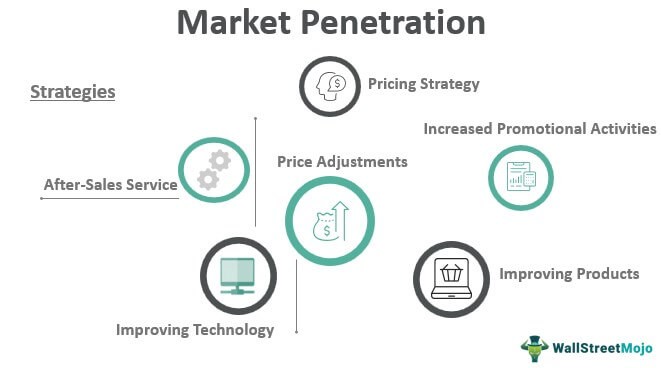Market Penetration
What is Market Penetration
Definition:
Market penetration refers to the strategic process of increasing a company’s market share within existing market segments or target markets. It involves implementing various tactics and initiatives to gain a larger portion of customers or sales within a specific industry or market niche.
Analogies:
Think of market penetration as expanding the footprint of a well-established brand in familiar territories. Just as a successful brand expands its presence into new neighborhoods, market penetration involves deepening the company’s reach and influence within its existing market segments, customer demographics, or geographical regions.
Further Description:
Market penetration strategies focus on maximizing sales of existing products or services to existing customers, attracting new customers from competitors, or stimulating higher usage rates among current customers. Companies employ diverse approaches, such as pricing adjustments, promotional campaigns, distribution enhancements, product enhancements, and competitive positioning to increase market penetration.
Key Strategies for Market Penetration:
- Price Adjustments: Offering competitive pricing or discounts to attract price-sensitive customers and encourage trial purchases, thereby expanding the customer base and increasing market share.
- Promotional Campaigns: Launching targeted marketing campaigns, advertising efforts, and promotional offers to raise brand awareness, stimulate demand, and drive sales among existing and potential customers.
- Product Bundling: Introducing product bundles, packages, or value-added services to enhance product appeal, increase perceived value, and encourage upselling or cross-selling opportunities.
- Distribution Expansion: Strengthening distribution channels, expanding retail presence, or leveraging e-commerce platforms to improve product accessibility, convenience, and availability for customers.
- Product Innovation: Introducing product enhancements, feature upgrades, or line extensions to meet evolving customer needs, differentiate offerings from competitors, and maintain relevance in the market.
- Market Segmentation: Identifying and targeting specific customer segments or market niches with tailored offerings, messaging, and value propositions to address unique preferences and requirements effectively.
Role of Market Penetration in Business Growth:
- Revenue Generation: Market penetration strategies drive revenue growth by increasing sales volumes, market share, and customer acquisition rates within existing markets or customer segments.
- Competitive Advantage: Deepening market penetration enhances a company’s competitive advantage by solidifying its position in the market, fortifying customer loyalty, and reducing vulnerability to competitive threats.
- Customer Relationships: Effective market penetration fosters stronger relationships with customers, builds brand loyalty, and enhances customer satisfaction by delivering value-added products, services, and experiences.
- Market Expansion: Successful market penetration initiatives pave the way for future market expansion opportunities, enabling companies to explore new market segments, geographical regions, or industry verticals with confidence and credibility.
Key Takeaways:
- Market penetration strategies play a pivotal role in driving business growth, enhancing competitiveness, and maximizing market potential within existing market segments or target markets.
- By leveraging pricing, promotion, distribution, product, and segmentation tactics, companies can deepen their market penetration, strengthen customer relationships, and achieve sustainable revenue growth and profitability.
- As companies navigate dynamic market conditions and evolving consumer preferences, market penetration remains a cornerstone strategy for unlocking growth opportunities, maintaining market relevance, and sustaining long-term success in competitive market landscapes.
Table of Contents





